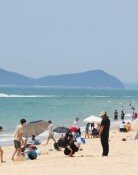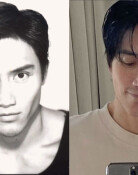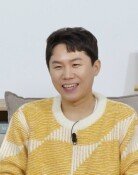Right-wing Abe set to compete for Japan`s PM post again
Right-wing Abe set to compete for Japan`s PM post again
Posted August. 27, 2012 07:10,
Former Japanese Prime Minister Shinzo Abe has openly expressed his intent to run for the country`s top post again amid right-wing nationalists gaining ground in recent months.
Abe, 58, angered Koreans for denying that the Japanese military forced thousands of Korean women to provide sex to Japanese soldiers in World War II, saying, "Comfort women (Japan`s euphemism for the sex slaves) are common in Korea because there are many gisaeng (Korean-style geisha) houses."
Set to be elected chairman of the main opposition Liberal Democratic Party in next month`s party convention, Abe is seeking to return for the first time in five years to Nakata, where the prime minister`s residence is situated.
According to Japanese media, Abe said on a TV show Saturday, "To amend our constitution is to significantly change the post-war system. I would like to devote my efforts to creating a strong nation," expressing his desire to run for his party`s chairmanship. He has apparently judged that Japan`s diplomatic conflicts with Korea and China will give him an advantage as a right-wing politician.
Abe will form early next month a research group on "strategy for new economic growth" comprising some 20 of his party`s members with the House of Councilors and House of Representatives. If leading hawkish members of the party join him, including Yoshihide Suga, former minister of internal affairs and communications, and Yasuhisa Shiozaki, who was chief cabinet secretary when Abe was prime minister, they are set to designate Abe as candidate for the party chairmanship.
Japanese media are also paying attention to the move to form a "conservative-conservative coalition" between Abe and Osaka Mayor Toru Hashimoto. Hashimoto recently proposed that Abe chair a new party. The mayor also said he supports the Abe administration`s claim that no evidence supports the notion that comfort women for the Japanese military were mobilized by force.
On the planned constitutional amendment and educational reform pursued by the Osaka Reformation Group, a regional party lead by Hashimoto, Abe told the mayor, "I`m moving in the same direction.¡± If Abe regains the post of prime minister in the next election, Japan`s shift toward a conservative and rightist ideology will likely accelerate further. He proposes a "strong Japan" through comprehensive amendment of the country`s Pacifist Constitution and granting Japan the right to collective defense.
He has also angered Korea with his views of the past history between both nations. In a 1997 lecture, he said, "There are many gisaeng (Korean-style geisha) houses in Korea, and thus many people routinely engage in such a thing (prostitution). So even I`ve come to think that such a thing (activities of comfort women) might not be nonsensical acts, but rather something routinely conducted in daily life."
The grandson of former Prime Minister Nobusuke Kishi from his mother`s side and the son of former Foreign Minister Shintaro Abe, Shinzo Abe became Japan`s youngest prime minister in September 2006 and the first born after the Second World War. After suffering a humiliating loss in the House of Councilors elections in July 2007, he resigned in a surprise move in a parliamentary session that September, provoking massive criticism. It is uncertain, however, if he can beat out incumbent chairman Sadakazu Tanigaki for the party`s top post. Public opinion is also not on his side since he failed once as prime minister.
lovesong@donga.com







